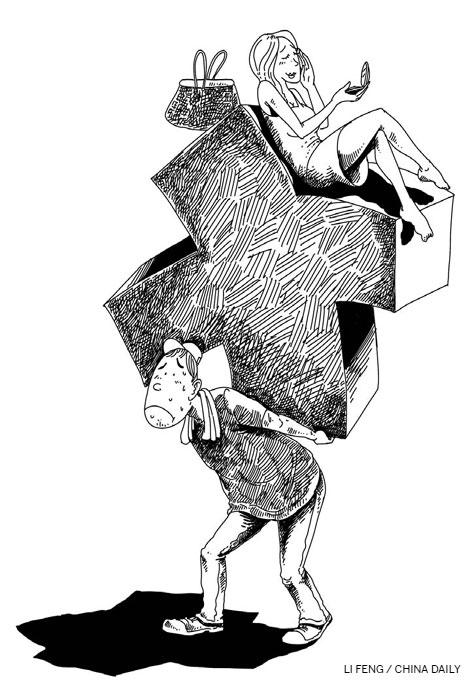The uncharitable work of charity
Updated: 2013-05-10 07:06
By He Bolin (China Daily)
|
||||||||

The Red Cross Society of China, being the largest charity organization in the country, should have led the relief operations in Ya'an city, Sichuan province, after it was hit by a magnitude-7 earthquake on April 20. But its once lofty credentials seem to have been tarnished beyond repair, and it has become an object of ridicule in public discussions, especially in cyberspace.
Immediately after the quake, the Red Cross said on its official weibo account that its team was on way to Ya'an. This posting was met by hundreds of thousands of responses in the form of a single Chinese word, gun, or "get out of the way". Netizens seemed to be unanimous in their choice of a disparaging term for the charity organization.
As if the online posting had not done enough damage to the Red Cross's reputation, volunteers seeking donations on the streets in Shenzhen, Guangdong province, were shunned by pedestrians. The nearly empty glass donation boxes of the volunteers reflected the Red Cross's shrinking image in people's mind.
No one could have imagined the Red Cross to encounter such a situation when it raised at least 4.3 billion yuan ($699 million) in cash and goods for the survivors of the devastating Wenchuan earthquake in 2008. From its charitable best in 2008, the Red Cross has slipped into a cesspool of scandals involving embezzlement of funds and other corrupt activities. It has also been accused of being opaque in its dealings.
The Red Cross created a huge controversy when it used the 84.72 million yuan it had raised by auctioning the works of 100-plus Chinese contemporary artists in 2008 on charity projects other than what it was meant for. Although the organization apologized for doing so, it said the projects on which the donation was used were still worthy of the donors' good intentions. The Red Cross should have known that regulations ban the use of donations collected for special purposes from being used on other projects without informing the donors.
The Guo Meimei scandal in 2011 dealt another severe blow to the organization. Guo, a young woman, posted her photographs in sports cars on weibo and claimed to be "China Red Cross business general manager". Since then, the Red Cross has been under fire. Recently some online postings demanded a re-investigation into the case.
The charity organization, however, has made a mess of the case. While Wang Yong, a representative of the Red Cross's independent social supervision committee, said on April 26 that the committee would independently decide whether or not the case should be re-investigated, the Red Cross issued a notice two days later insisting that its earlier investigation had been conclusive.
Such an attitude of the Red Cross has confirmed many people's doubts that the Guo Meimei scandal was just the tip of an iceberg. Besides, the organization's refusal to take legal measures against Guo Meimei for damaging its reputation has prompted people to believe there are a lot more skeletons in its cupboard. People who support the healthy development for charity organizations in China deserve to know the truth behind the Guo Meimei case.
The problem of transparency is not restricted to the Red Cross. It encompasses all charity organizations, some of which are quasi-governmental, with directors who often are retired government officials, and depend on local governments' support.
While administrative support gives such organizations certain advantages in raising funds, especially during emergencies, they could be too bureaucratic to allow them to function to their full potential. As Wang Zhenyao, a charity researcher and former civil servant, says, the Red Cross is a government-managed, international civil organization, so it's almost impossible to reform it overnight and restore people's confidence in it.
But there is no option but to implement reforms, perhaps gradually, in charity organizations. Reforms will not only further the healthy development of the charity cause in China, but also help create the social environment for people to donate instinctively, regularly and generously to charity.
The author is a reporter with China Daily.
E-mail: hebolin@chinadaily.com.cn.
(China Daily 05/10/2013 page9)

 Michelle lays roses at site along Berlin Wall
Michelle lays roses at site along Berlin Wall
 Historic space lecture in Tiangong-1 commences
Historic space lecture in Tiangong-1 commences
 'Sopranos' Star James Gandolfini dead at 51
'Sopranos' Star James Gandolfini dead at 51
 UN: Number of refugees hits 18-year high
UN: Number of refugees hits 18-year high
 Slide: Jet exercises from aircraft carrier
Slide: Jet exercises from aircraft carrier
 Talks establish fishery hotline
Talks establish fishery hotline
 Foreign buyers eye Chinese drones
Foreign buyers eye Chinese drones
 UN chief hails China's peacekeepers
UN chief hails China's peacekeepers
Most Viewed
Editor's Picks

|

|

|

|

|

|
Today's Top News
Shenzhou X astronaut gives lecture today
US told to reassess duties on Chinese paper
Chinese seek greater share of satellite market
Russia rejects Obama's nuke cut proposal
US immigration bill sees Senate breakthrough
Brazilian cities revoke fare hikes
Moody's warns on China's local govt debt
Air quality in major cities drops in May
US Weekly

|

|







